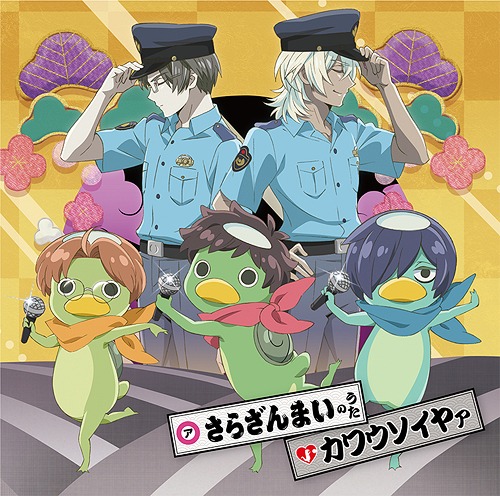

Out of the numerous yokai, a broad classification of supernatural beings and creatures in Japanese traditional folklore and mythology, kappa are among the best known with copious depictions in art, literature, and even manga and anime throughout the ages. So what are these strange amphibious creatures obsessed with cucumbers and sumo wrestling? Read on to find out more about kappa and their impact on Japanese culture and media!
What is a Kappa?
The word kappa itself is a combination of kawa (meaning ‘river’) and wappa (a somewhat obscure form of an archaic word meaning ‘child’). This is further complicated by many regional names for the same creature such as kawaso (which also means otter) and kawako (which is kawa plus kodomo, the modern world for child). In any case, kappa are typically depicted as humanoid creatures roughly the size of a child that live in rivers or ponds. They usually have green, slimy (or scaly) skin, a turtle-like shell on their back, webbed feet and hands, large eyes, a bird-like beak, and a distinctive “dish” cavity on top of their heads (called sara) that holds a pool of water in the center and is surrounded by hair that often resembles plant leaves or reeds.
Kappa Traits and Behavior
True to their often English-localized name of “river imp”, kappa are typically described as being quite mischievous, frequently playing tricks on humans and doing things like stealing food, especially their preferred food: cucumbers. They are also said to be competitive, sometimes challenging humans to sumo wrestling or shogi matches and sometimes perform good deeds like irrigating farmers' lands or giving people fresh fish. Once befriended, they are supposedly very loyal. Coversely, kappa can also be malevolent with many accounts of them drowning humans and animals (particularly horses), kidnapping children, and even cases of eating or raping humans. One particularly peculiar behavior involves a mythical organ called a shirikodama that kappa are said to be able to remove from humans’ anuses to gain power and steal their soul. When kappa are not submerged, the dish on their heads holds a small pool of water which allows them to survive on land as long as it remains wet. Since kappa are also said to be obsessed with manners, the easiest way to subdue them is to bow deeply as they will return the favor and spill out their dish, rendering them unable to move until it is replenished. According to folklore, if you do refill their dish using water from where they live, they will become your friend forever.
Kappa in Modern Japanese Culture and Anime
Like some other famous yokai such as oni and tengu, kappa have become part of pop culture while still remaining important in their religious origins. There are still Shinto shrines and ceremonies dedicated to kappa across Japan and they are also famously venerated at the Sogenji Buddhist temple in the Asakusa district of Tokyo which has enshrined the mummified arm of a kappa. Cute modern versions of kappa often appear as mascot characters for towns and businesses or on warning signs near rivers and ponds. One prominent modern example is Shiki City’s bass guitar-playing kappa mascot Kapal who won the Yuru-chara Grand Prix in 2018 as Japan’s most popular mascot. Likewise, kappa characters have been featured in many manga and anime series, perhaps most prominently in last season’s Sarazanmai and Keiichi Hara’s film Summer Days with Coo.
Sarazanmai

The latest from revolutionary director Kunihiko Ikuhara, Sarazanmai tells the story of three boys who repeatedly transform into kappa to capture shirikodama from the butts of strange ‘kappa zombies’. Sarazanmai references nearly every aspect of kappa lore from their love of cucumbers to the aforementioned shirikodama, sumo, and even their alternative name of kawaso also meaning otter with Otter Empire as the main antagonist.
Sarazanmai OP
Kappa no Coo to Natsuyasumi (Summer Days with Coo)
A young boy named Koichi stumbles upon a large stone that turns out to be a fossilized kappa. Naming the revived kappa Coo, Koichi and his family must adjust to life with their strange new friend, especially after the news media gets wind of Coo’s existence. Summer Days with Coo is a heartwarming adventure film exploring friendship, family, and traditional Japanese folklore.
Some other anime examples of kappa include the character Kawamatsu the Kappa, a master sumo wrestler and samurai from Wano Country in One Piece; Kappa no Kaikata, a show about a young man who decides to raise a kappa; and Sha Gojyo from InuYasha. Kappa have also appeared in many Japanese video games such as the oddly marriable Kappa in Harvest Moon: More Friends of Mineral Town, Kapp'n from Animal Crossing, and Pokémon with the Lotad, Lombre, and Ludicolo family and Golduck all being at least partially based on kappa.
Final Thoughts

Undoubtedly weird and quintessentially Japanese, kappa have been an enduring (and sometimes endearing) part of Japanese folklore for centuries and remain an interesting facet of the culture today. How do you feel about kappa? Share your favorite kappa characters and any other thoughts in the comments section below and be sure to stick around Honey’s for more of all things awesome, Japanese culture, anime, and otherwise! Until next time~!
[recommendedPost post_id='248175' url='' title='' img='' class='' widget_title='']
Add Comments